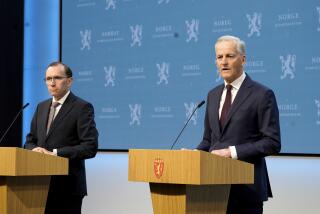Europe praises choice of Liu for Nobel
- Share via
Reporting from London — Governments and human rights activists in Europe praised the Norwegian Nobel Committee’s decision to award its prestigious peace price to Chinese dissident Liu Xiabao on Friday, their voices reflecting a deepening concern on the continent about Beijing’s domestic political repression.
Many European governments had muted their criticism of China’s human rights record over the last decade as they chased growing trade and business opportunities in the emerging economic giant. But an underlying current of unease has been stirring in the last two years, prompted by negative impressions of China’s crackdown on ethnic dissent before the 2008 Beijing Summer Olympics and what was seen as its obstructionist tactics that helped scuttle last year’s climate change negotiations.
France, Germany, Italy, Britain and the European Union all issued statements applauding the Nobel selection. The British government noted that it had raised Liu’s imprisonment with Chinese officials.
“They are very good economists, very good technocrats, but they are truly lousy politicians,” said Kerry Brown, a China analyst at the London-based think tank Chatham House. “They have a problem [with human rights], and they need to think of a better way of dealing with it than banging people up in jail.”
Brown thinks the immediate effect of honoring Liu may be a further tightening on dissent.
“The hard-liners in China will see this as just a Western conspiracy, and in the short term it will probably make things worse for dissidents,” he said. “But in the long term it is hugely damaging for the Chinese political elite, who seem to want international legitimization.
“The prize may show them the international community grass roots and government are expecting more from them,” Brown said.
European criticism of China’s rights record flared in the run-up to the 2008 Olympics, when the Olympic torch relay was met with loud and aggressive demonstrations in London and Paris against what was seen as Chinese repression of Tibetan and Uighur freedoms. British television documentaries in 2008 showed the high spirits and energy unleashed by the Beijing Games but also the misery behind the preparations, as poor families were dispossessed and chased from their houses and land to make way for Olympic construction.
Many European governments were also angry last December over what they saw as China’s failure to assume leadership during talks in Copenhagen aimed at forging a global treaty on climate change. Beijing’s resistance to reducing carbon emissions to levels favored by Europeans appeared to expose the futility of diplomacy that downplayed human rights concerns in the hope that China would then work more cooperatively on global issues.
The result of that disillusionment has been a discernible hardening in public attitudes toward China.
Despite Friday’s expressions of support for Liu, some observers noted, the European appetite to do business with China has hardly abated.
“Europe still wants a closer, tighter commercial relationship with China,” said Charles Grant, director of the Center for European Reform in London. “The Chinese think we’re obsessed with human rights when in fact we’re not. Southern Europe — Greece, Spain, Italy, Portugal — are not too concerned about pressing China on human rights.”
Even in Northern Europe, he said, “human rights is seen as something you mention occasionally but shouldn’t let intrude in your commercial relationships.”
Rana Mitter, a professor of Chinese politics at Oxford University, echoed that view.
“The Chinese are very good at picking on specific targets,” he said. “They [responded to the peace prize ] with threats against Norway rather than Europe. They lambasted France, not Europe or the EU, for disrupting the Olympic torch relay.”
The uproar of approval for the award will die down, he predicted, and “the Chinese will see no great diplomatic usefulness in making this a major flare-up.”
Stobart is a staff writer in The Times’ London Bureau.
More to Read
Sign up for Essential California
The most important California stories and recommendations in your inbox every morning.
You may occasionally receive promotional content from the Los Angeles Times.













